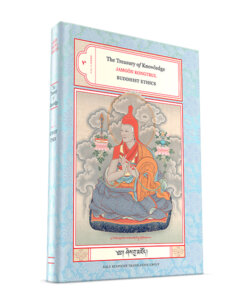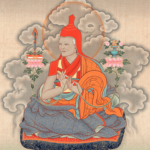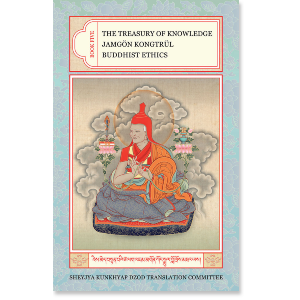| The following article is from the Spring, 2003 issue of the Snow Lion Newsletter and is for historical reference only. You can see this in context of the original newsletter here. |

Here's an excerpt.

The Suitable Candidate for the Bodhisattva's Training
A suitable candidate for the bodhisattva's training is gifted with faith, kindness, intelligence,
And the stamina to engage in the bodhisattva's conduct, does not seek personal peace,
Is energetic, and delights in hearing about emptiness.
A suitable candidate for the bodhisattva's training should have the following qualities: faith in the collections of teachings on the Universal Way and in the spiritual guides of that tradition, loving-kindness and compassion toward others, intelligence [capable of] realizing profound and magnificent [doctrines], and the stamina to engage with courage in a vast range of [bodhisattva] practices (such as the four means of attracting disciples and the six perfections. This individual is not seeking persona] peace and happiness but is working with joy in order to liberate all sentient beings. He or she is always energetic and delights in hearing about the profound subject of emptiness. These qualities indicate that the spiritual potential for the Universal Way has awakened. The Ten Qualities Scripture states:
The spiritual potential of the wise bodhisattva
Is known by its signs
As fire is indicated by smoke,
And water, by herons.
Also, [Aryadeva's] Experientialist Four Hundred states:
The individual who is impartial, intelligent, and persevering,
Is referred to as a suitable disciple.
[To explain,] impartiality refers to freedom from bias toward one's own spiritual tradition and a dislike of others' traditions. Intelligence refers to [the capacity to] discriminate between the value of true doctrines and the futility of fallacious ones. Perseverance refers to dedication to the practice of the Universal Way The disciple who possesses these three qualities will appreciate the excellent virtues of the spiritual guide. The disciple who lacks these qualities will see shortcomings in even the most gifted spiritual guide.
Phases in the Process of Assuming Vows
The vows' seeds are planted when the body, speech, and mind are consecrated;
they are formed with the promise to maintain them and blessed by the descent of pristine awareness;
The main conferral of initiation brings them to the apex.
The process of assuming the vows of Secret Mantra begins when the body, speech, and mind of the disciple have been consecrated as the three vajras [in the preparatory ritual] and is completed only at the end of the conclusive initiation given through symbols of the particular class of tantra.
The seeds of the mantic vows are planted with the consecration of the disciple's body, speech, and mind as the three vajras. The vows are formed with the triple repetition to take the vows of the five buddha families. They are blessed by the descent of pristine awareness [upon the outer and inner entry into the mandala, respectively]. They are augmented during the central part of the initiation when the conferral of the initiations of the five buddha families and the conduct initiations consecrates the disciples' five aggregates as the five buddhas (Akshobhya, etc.), and their reality [veiled] by impurities [is consecrated] as Vajrasattva, the sixth buddha. The vows are greatly augmented in the vase initiation when the impurity of adherence to ordinary appearances is cleansed in [the experience of] the world and its inhabitants manifesting as the display of the deities and their supporting mandala. The vows reach their apex in the course of the three higher initiations, which are the supreme ones, when the impurity of considering the deity as real is also cleansed and all aspects of cyclic existence and perfect peace are released into great pristine awareness, the union of bliss and emptiness. This is the point at which the mantric vows of the Highest Yoga Tantra have formed completely and have been fully assumed.
With the conferral of the main initiation of one of the four classes of tantra, disciples also receive the vajra-master initiation that invests them with the authority to give initiations, teach [the tantras], perform consecrations, etc. In the conclusive [initiation] given through the symbols [of auspiciousness], disciples make a succinctly formulated promise three times to maintain the pledges to which a vajra master is bound after these pledges have been extensively illustrated [by the initiating master]. At the end of this triple promise, the mantra vows are fully assumed, and from this point forward, disciples become susceptible to the root downfalls of the specific class of tantra. For this reason, it is said that the vows are fully assumed at the conclusion of the initiation and not before.
Differentiations between the Vows of the Higher and Lower Tantras
Mantric vows of the lower tantras are called incomplete or partially complete;
And those of the higher tantras, fully complete.
Bliss and emptiness, as two or as one, embrace all vows.
Earlier scholars designated the mantric vows of the lower classes of tantra as incomplete (those of Action and Conduct tantras) or partially complete (those of Yoga Tantra); and mantric vows of the Highest Yoga Tantra, as complete, according to the extent to which the mantric vows are assumed. In short, all vows and pledges are encompassed by two pledges: the ultimate pledge of skill in means, profound bliss, and the relative pledge of wisdom, emptiness comprehensive of all [aspects]. All too are embraced by the single vow of EVAM, the union of skill in means and wisdom. Accordingly, the Two-Part Hevajra Tantra states:
The vow of all the buddhas
Existing in the aspect of EVAM
Is the great bliss of EVAM
To be realized through initiation.
Since the vow of EVAM pertains to both ground and fruition stages, the Buddha himself called it the great pledge. The Continuation of the Guhyasamaja Tantra states:
It is the vow or pledge
Taught by One Beyond Worldly Conduct.
And Manjushri's Magical Net:
Our Teacher, guide of beings,
Realized this one great pledge.
The same is explained in detail in Samvarodaya and other tantras.


